 MyDogBreeds
MyDogBreeds Kerry Blue Terrier is originated from Ireland but Harrier is originated from United Kingdom. Both Kerry Blue Terrier and Harrier are having almost same height. Kerry Blue Terrier may weigh 9 kg / 19 pounds lesser than Harrier. Both Kerry Blue Terrier and Harrier has almost same life span. Kerry Blue Terrier may have more litter size than Harrier. Both Kerry Blue Terrier and Harrier requires Moderate maintenance.
Kerry Blue Terrier is originated from Ireland but Harrier is originated from United Kingdom. Both Kerry Blue Terrier and Harrier are having almost same height. Kerry Blue Terrier may weigh 9 kg / 19 pounds lesser than Harrier. Both Kerry Blue Terrier and Harrier has almost same life span. Kerry Blue Terrier may have more litter size than Harrier. Both Kerry Blue Terrier and Harrier requires Moderate maintenance.
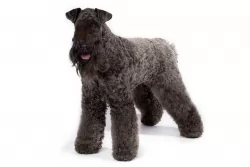 The Kerry Blue Terrier hails from Ireland, with the name of the dog coming from a place known as County Kerry, and Blue being the color of the dog's coat.
The Kerry Blue Terrier hails from Ireland, with the name of the dog coming from a place known as County Kerry, and Blue being the color of the dog's coat.
The Kerry Blue was originally bred to control rats, rabbits and otters and was actually a working dog for a host of different jobs.
It was in 1922 that the United States Kerry Blue Terrier Club was founded and recognized by the AKC in 1924.
 Developed in Great Britain, the Harrier is another hunting dog – a hound that primarily hunts hares and small prey. The breed itself is medium sized - smaller than an English Foxhound and larger than a Beagle. Although the definitive origins of the Harrier are not set, it is believed that he is a cross of the Basset Hound, Talbot Hound and Bloodhound. Others believe the breed is a cross of the Greyhound and the English Foxhound. The Harrier looks like a smaller version of the English Foxhound.
Developed in Great Britain, the Harrier is another hunting dog – a hound that primarily hunts hares and small prey. The breed itself is medium sized - smaller than an English Foxhound and larger than a Beagle. Although the definitive origins of the Harrier are not set, it is believed that he is a cross of the Basset Hound, Talbot Hound and Bloodhound. Others believe the breed is a cross of the Greyhound and the English Foxhound. The Harrier looks like a smaller version of the English Foxhound.
The Harrier is a pack dog and in 1260, Sir Elias de Midhope established the first pack in England. From there the breed spread to Wales and Western England, most used in Ireland where they hunt fox as well as hares. However, hunting hares is the specialty of the breed and even gave the breed its name. In 1885 they were recognized by the American Kennel Club in the Hound Group. Yet despite this and despite the number of Harriers working in England, they are not recognized by the UKC.
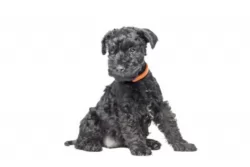 The Kerry Blue is a small dog standing at between 44 to 51cm and weighing anything between 15 and 18kg. He has dark eyes which give him that typical alert Terrier expression.
The Kerry Blue is a small dog standing at between 44 to 51cm and weighing anything between 15 and 18kg. He has dark eyes which give him that typical alert Terrier expression.
The ears are small and are carried up before flopping down. The high-set tail has always been customarily docked, giving him a compact, jaunty appearance but these days, the tail tends to be left long, curling somewhat over the back.
He has a coat which is quite wavy or curly and comes in different shades of grey or blue, while the puppies are born black, gradually becoming more blue. The dog is considered to be hypoallergenic as it doesn't shed a lot.
Kerry Blue Terriers are strong willed dogs, but with training and socialization they respond well to instructions such as sit, come, lie-down and stay. As a Terrier breed he is feisty, lively, strong-willed, stubborn, independent and impulsive. They are loyal and affectionate towards their owners and are amicable with children and pets in the home.
Training and socialization develops a balanced attitude around his human family, other animals in the home and around strangers. He is an active dog too so whether he lives in the city or the countryside, he will require a lot of exercise as he is full of life.
You can’t just put him in the backyard and forget about him. He is an intelligent, social dog who will only do well when he is counted in as a family member.
 The Harrier is a typical hound dog much like the English Foxhound. The breed is a little smaller than the Foxhound but is muscular and large boned like his cousin. They have short hard hair that sheds and ears that hang. The Harrier is a large boned breed built for strength and stamina in the race with hares. They have broad skulls, strong muzzles, with hazel or brown eyes. They also have a black, wide nose and a high, medium length tail.
The Harrier is a typical hound dog much like the English Foxhound. The breed is a little smaller than the Foxhound but is muscular and large boned like his cousin. They have short hard hair that sheds and ears that hang. The Harrier is a large boned breed built for strength and stamina in the race with hares. They have broad skulls, strong muzzles, with hazel or brown eyes. They also have a black, wide nose and a high, medium length tail.
They say he has a ‘courtly grin’ on an expressive face. Being pack dogs, they must be sturdy, able to cover any type of terrain, for as long as the hare runs. It is critical that their scenting and running tools are exceptional. He is blue or yellow-pied. His feet are cat like and the chest is dropped low. He is an extremely well-proportioned dog
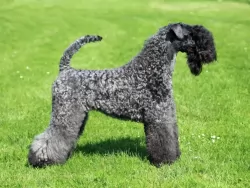 When you bring a Kerry Blue Terrier into your home and your life, you’re going to have a jaunty, lively, comical pet in your home, as he certainly has the reputation of making people laugh.
When you bring a Kerry Blue Terrier into your home and your life, you’re going to have a jaunty, lively, comical pet in your home, as he certainly has the reputation of making people laugh.
He is such an intelligent dog too and has no difficulty with learning new tricks. He takes his role of watchdog seriously too, as he loves his human family and wants to be looking out for them.
When you bring a Kerry Blue Terrier into your home, you can be assured of jolly good fun from a true canine companion.
 Yes, they are good with children but are very rambunctious and should be supervised with young children.
Yes, they are good with children but are very rambunctious and should be supervised with young children.
Scenting ability and wonderful personality
This breed is very adaptable as long as it gets enough exercise. He can live in the country or she can live in the city with an outlet for exercise.
Smart but stubborn at times. Therefore, his learning ability is moderate.
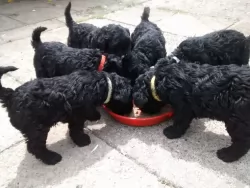 You aren’t going to be running to the vet often with your Kerry Blue as he is a healthy dog breed. However there are some common dog diseases that even the most healthiest of dogs can succumb to.
You aren’t going to be running to the vet often with your Kerry Blue as he is a healthy dog breed. However there are some common dog diseases that even the most healthiest of dogs can succumb to.
Always feed your dog the very best food there is so that he has a strong immune system that can fight off disease.
This is the inward rolling of the eyelid which can irritate the dog’s eye and even cause vision loss. Surgery can treat the problem.
Every dog can succumb to cancer. You may well find a lump or even detect a sore that won’t heal. Treatments for cancer can include medicines, chemotherapy and surgery.
This is an inherited condition to do with the hip joint. It can result in pain for your dog and even lameness. When you discover your pet no longer wants to play and he battles to get up after lying down, he will need to go to the vet. Dogs with this debilitating disease should never be bred.
 It seems the only real health issue other than hunting accidents or foot and toe incidents due to hunting.is:
It seems the only real health issue other than hunting accidents or foot and toe incidents due to hunting.is:
This abnormality in the hip socket can cause arthritis and lameness that is very painful. This is the most severe form. The Harrier can have a milder form that does not progress to this level. Hip dysplasia has a genetic component, but the environment plays a role as well and active hunting dogs are especially prone to this.
Floppy ears that hang down are always susceptible to ear infections. Check them often and clean them at least weekly.
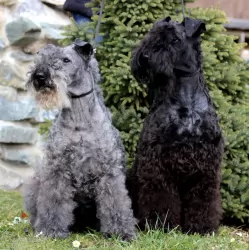 The Kerry Blue’s coat doesn’t shed a lot but it’s a curly coat that will require brushing at least twice a week. He will also require clipping and trimming if you want to keep the coat manageable.
The Kerry Blue’s coat doesn’t shed a lot but it’s a curly coat that will require brushing at least twice a week. He will also require clipping and trimming if you want to keep the coat manageable.
Nutrition is a key part of a healthy Kerry Blue Terrier and instead of just plonking down a bowl of dry kibble every day, make his mealtimes something to look forward to, more sustaining and more interesting.
Top quality kibble is good every now and then but try mixing in some cooked chicken, brown rice, pasta and vegetables occasionally as well as a little bit of raw meat. You will be rewarded with bright eyes, a wet nose, bushy, wagging tail and less trips to the vet.
Make sure there is always a supply of fresh, cool water for him.
Active and lively, your Kerry Blue will need lots of robust exercise – a daily walk as well as ball games which ensure his muscles are kept strong and toned. Not only that, this exercise is important for keeping him fit and also mentally alert.
 Feed a high nutrition puppy food dry food made for an energetic breed. Feed 3 times a day ½-3/4 cup each time.
Feed a high nutrition puppy food dry food made for an energetic breed. Feed 3 times a day ½-3/4 cup each time.
Again feed a high nutrition adult food for an active breed. Feed twice a day 1-11/2 cups each time.
Outstanding health unless in a hunting accident.
The Harrier is an energetic, hunting breed that needs a lot of exercise on a daily basis. Long walks and jogging or running is good for the Harrier. If they are not working, hunting dogs they need more exercise. A fenced yard for playing is good. If this intense breed does not get enough exercise and mental stimulation, he needs there could be issues with destructive behavior and obesity. Flyball, tracking, agility, coursing, rally and hunting are great activities for this breed of dog. In addition, they are pack animals and do better in a family that has more than one dog.